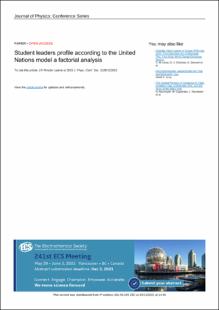| dc.contributor.author | Rincón Leal, Olga Lucy | |
| dc.contributor.author | Vergel Ortega, Mawency | |
| dc.date.accessioned | 2021-11-23T14:35:34Z | |
| dc.date.available | 2021-11-23T14:35:34Z | |
| dc.date.issued | 2019-09-30 | |
| dc.identifier.uri | http://repositorio.ufps.edu.co/handle/ufps/1271 | |
| dc.description.abstract | The objective of this research was to create a structural model able to explain the profile of student leaders during their youth stage, by implementing the pedagogical model form national university organization, in order to develop skills from a cognitive approach using an event-based learning trend. The research had a quantitative methodological approach, addressing differences in the students' cognitive abilities for oral expression and textual production, along with a correlational method of factorial design analysis, as a field type. The beneficiary population was made up of students from private educational institutions with an average age of 17 years. According to the model, it was found that among the factors associated with leadership are, the ability to lobby, strategies, critical reading, intensity of the debate, discourse analysis, quality of presentation, decision making, characteristics that determine the profile of a ruler. | eng |
| dc.format.extent | 6 Páginas | spa |
| dc.format.mimetype | application/pdf | spa |
| dc.language.iso | eng | spa |
| dc.publisher | Journal of Physics: Conference Series | spa |
| dc.relation.ispartof | Journal of Physics: Conference Series ISSN: 1742-6596, 2019 vol:1329 fasc: 1 págs: 120 - 126, DOI:10.1088/1742-6596/1329/1/012015 | |
| dc.rights | Content from this work may be used under the terms of the Creative Commons Attribution 3.0 licence. | eng |
| dc.rights.uri | https://creativecommons.org/licenses/by/4.0/ | spa |
| dc.source | https://iopscience.iop.org/article/10.1088/1742-6596/1329/1/012015/meta | spa |
| dc.title | Student leaders profile according to the United Nations model a factorial analysis | eng |
| dc.type | Artículo de revista | spa |
| dcterms.references | Marulanda J, Correa G y and Mejía L 2009 Emprendimiento: Visiones desde las teorias del comportamiento humano Revista EAN 66 153-168 | spa |
| dcterms.references | Jakovcevic A, Irrazábal M y and Bentosela M 2011 Cognición social en animales y humanos: ¿Es posible establecer un continuo? Suma Psicológica 18 35-46 | spa |
| dcterms.references | Juárez F y and Contreras F 2012 Liderazgo y Complejidad: Conceptualizaciones e implicaciones para la organización actual 2 (España: Editorial Académia Española) 72 | spa |
| dcterms.references | Tobón S 2010 Formación Integral y Competencias. Pensamiento complejo, currículo, didáctica y evaluación 4 (Bogotá: Ecoe Ediciones) | spa |
| dcterms.references | Hernández R, Fernández C y and Baptista P 2003 Metodología de la investigación 5 (Bogotá: McGraw-Hill Interamericana) | spa |
| dcterms.references | Gracia E and Herrero J 2007 Measuring perceived community support: Factorial structure, longitudinal invariance, and predictive validity of the PCSQ (perceived community support questionnaire) Journal of Community Psychology 35 197-217 | spa |
| dcterms.references | Hair J, Anderson R, Tatham R. y and Black W 1999 Análisis Multivariante 5 (Madrid: Prentice Hall Iberia) | spa |
| dcterms.references | Ramos A 2012 Manual de protocolo XIX modelo ONU Asobilca (Cali: Universidad San Buenaventura) | spa |
| dcterms.references | Habermas J 2010 El concepto de dignidad humana y la utopía realista de los derechos humanos Diánoia 55 3-25 | spa |
| dcterms.references | García-Solarte M 2015 Formulación de un modelo de liderazgo desde las teorías organizacionales Entramado 15 60-79 | spa |
| dcterms.references | Goldsmith H 1986 Temperament discussed: Temperament and development in infancy and childhood ed G. Kohnstamm et al (Netherlands: Swets & Zeitlinger Publishers) Heritability of temperament: Cautions and some empirical evidence 83-96 | spa |
| dcterms.references | Marsh H. and Shavelson R 1985 Self: concept: Its multifaceted hierarchichal structure Journal Educational Psychologist 20 107-123 | spa |
| dcterms.references | Ferrando J y Anguiano-Carrasco C 2010 El análsis factorial como técnica de investigación en psicología Papeles del Psicólogo 31 18-33 | spa |
| dcterms.references | Sánchez I 2008 Los estilos de dirección y liderazgo. Propuesta de un modelo de caracterización y análisis Pensamiento y Gestión 25 1-39 | spa |
| dcterms.references | Maquilón J 2011 Nuevos desafíos en la formación del profesorado Revista Electrónica Interuniversitaria de Formación del Profesorado 36 349 | spa |
| dc.identifier.doi | https://doi.org/10.1088/1742-6596/1329/1/012015 | |
| dc.publisher.place | España | spa |
| dc.relation.citationedition | Vol. 1329 No. (2019) | spa |
| dc.relation.citationendpage | 126 | spa |
| dc.relation.citationissue | (2019) | spa |
| dc.relation.citationstartpage | 120 | spa |
| dc.relation.citationvolume | 1329 | spa |
| dc.relation.cites | J F Rincón Leal et al 2019 J. Phys.: Conf. Ser. 1329 012015 | |
| dc.relation.cites | "Student leaders profile according to the United Nations model a factorial analysis", Journal of Physics: Conference Series, vol. 1329, p. 6, 2019. | |
| dc.relation.ispartofjournal | Journal of Physics: Conference Series | spa |
| dc.rights.accessrights | info:eu-repo/semantics/openAccess | spa |
| dc.rights.creativecommons | Atribución 4.0 Internacional (CC BY 4.0) | spa |
| dc.type.coar | http://purl.org/coar/resource_type/c_6501 | spa |
| dc.type.content | Text | spa |
| dc.type.driver | info:eu-repo/semantics/article | spa |
| dc.type.redcol | http://purl.org/redcol/resource_type/ART | spa |
| oaire.accessrights | http://purl.org/coar/access_right/c_abf2 | spa |
| oaire.version | http://purl.org/coar/version/c_970fb48d4fbd8a85 | spa |
| dc.type.version | info:eu-repo/semantics/publishedVersion | spa |











